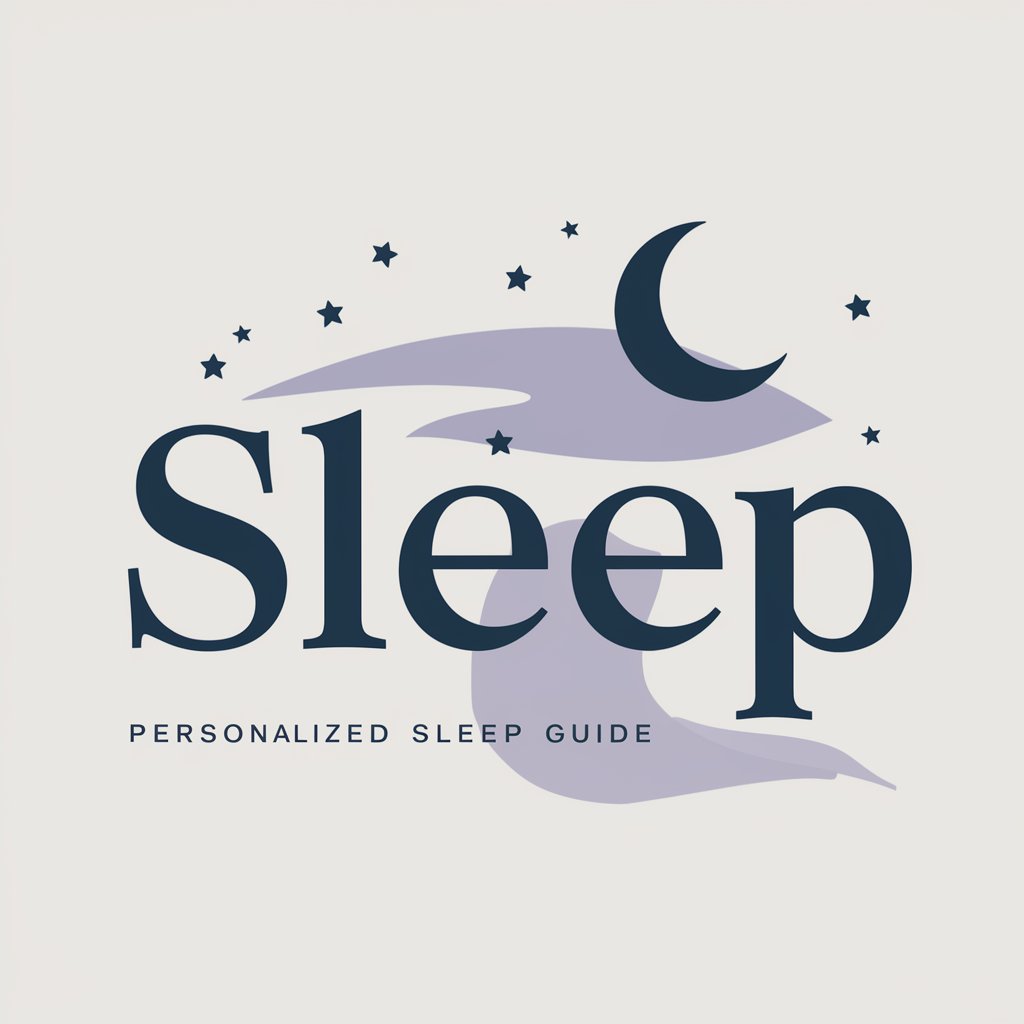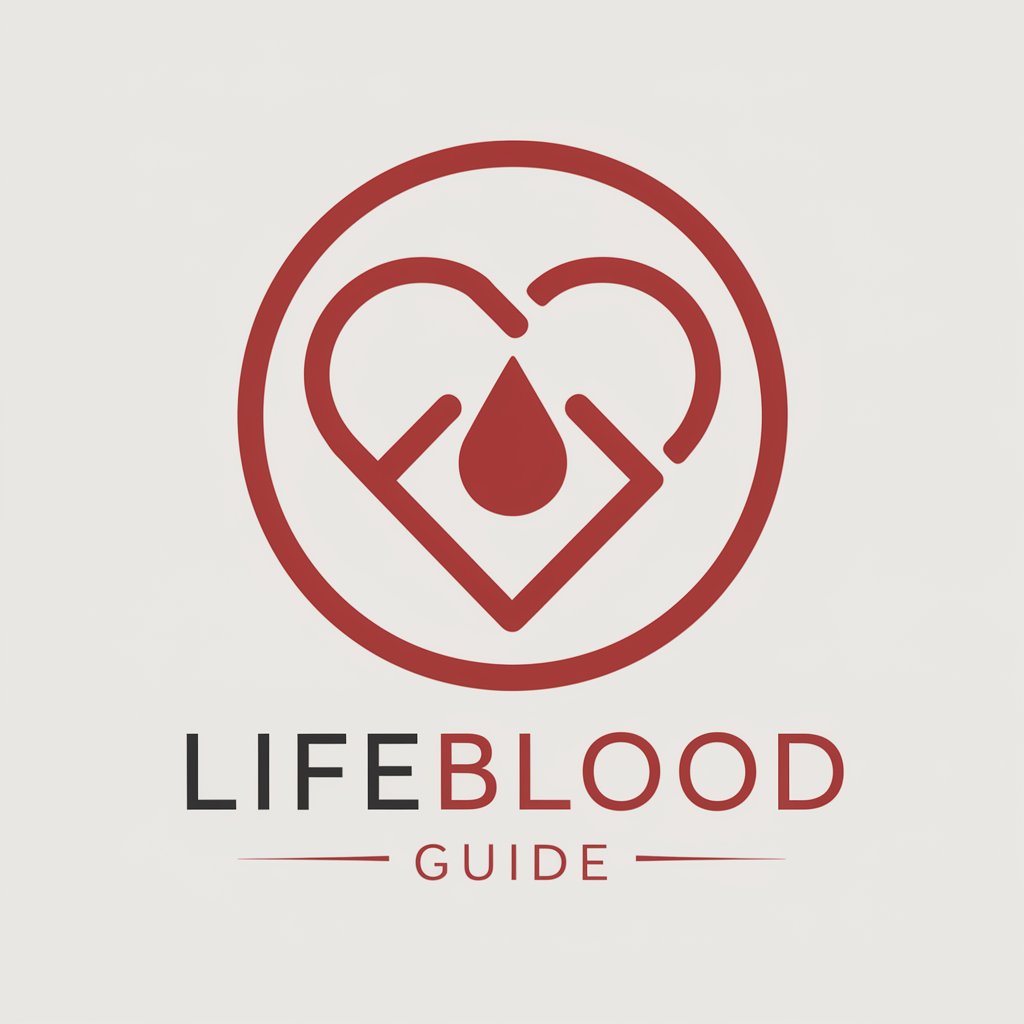Sleep - Personalized Sleep Guidance

Welcome! Let's improve your sleep together.
Optimize your sleep with AI-driven advice
What are some effective bedtime routines to help me fall asleep faster?
Can you suggest ways to create a sleep-friendly environment in my bedroom?
What relaxation techniques can I try before bed to improve my sleep quality?
How can I adjust my sleep schedule to be more consistent and restful?
Get Embed Code
Introduction to Sleep
Sleep is a specialized, dynamic guide designed to assist individuals in improving their sleep quality and overcoming common sleep-related issues. Its purpose is rooted in providing tailored advice and strategies that encompass a range of sleep improvement techniques, environmental adjustments, and relaxation methods. Unlike generic sleep aids, Sleep adapts its recommendations to the unique needs and feedback of its users, ensuring a personalized approach. For instance, if someone struggles with insomnia due to stress, Sleep might suggest specific relaxation techniques before bed, such as guided imagery or progressive muscle relaxation, and advise on creating a more sleep-conducive environment by adjusting lighting and temperature. Powered by ChatGPT-4o。

Main Functions of Sleep
Personalized Sleep Improvement Strategies
Example
For a user experiencing difficulty falling asleep, Sleep could recommend a tailored bedtime routine that includes winding down activities, such as reading or listening to soft music, and limiting exposure to screens an hour before bed.
Scenario
A scenario might involve an individual who has recently started working night shifts and is struggling to adapt their sleep schedule. Sleep would provide advice on managing light exposure to better align their circadian rhythm with their new schedule.
Environment Optimization for Better Sleep
Example
Sleep might suggest adjustments in bedroom ambiance by incorporating white noise machines to drown out disruptive sounds for a user living in a noisy urban area.
Scenario
In a situation where someone finds their sleep frequently interrupted by external noise or discomfort, Sleep would offer insights into making their sleeping environment more conducive to uninterrupted sleep, such as using blackout curtains and the right type of mattress.
Stress and Anxiety Reduction Techniques
Example
For individuals whose sleep is affected by stress, Sleep recommends practices like mindfulness meditation, deep breathing exercises, or yoga before bed to promote relaxation and ease the transition into sleep.
Scenario
A person dealing with pre-sleep anxiety could be guided through a series of relaxation exercises and mental unwinding techniques to help mitigate their anxiety and facilitate a smoother journey to sleep.
Ideal Users of Sleep Services
Individuals with Sleep Disorders
People suffering from conditions such as insomnia, sleep apnea, or restless leg syndrome would find Sleep's services beneficial. By providing non-medical, lifestyle-based interventions, these users can explore various strategies to mitigate their symptoms and improve sleep quality.
Shift Workers
Those with irregular work hours, such as night shifts or rotating schedules, often struggle with maintaining a consistent sleep routine. Sleep offers customized advice for adapting sleep environments and habits to better accommodate their unique schedules.
Stressed or Anxious Individuals
People experiencing stress or anxiety that impacts their sleep can benefit from Sleep's relaxation and mindfulness techniques, designed to calm the mind and prepare the body for rest.
General Population Seeking Better Sleep Quality
Essentially, anyone looking to improve their sleep quality, whether to enhance overall well-being, boost productivity, or simply enjoy the benefits of a good night's rest, is an ideal user. Sleep's personalized approach ensures that each user's specific needs and preferences are addressed.

How to Use Sleep
Initiate Trial
Begin by visiting yeschat.ai to start your free trial, offering full access without any need for a login or subscription to ChatGPT Plus.
Identify Needs
Consider your specific sleep challenges or goals. Whether it's improving sleep quality, managing insomnia, or establishing a healthier sleep routine, knowing your needs will help tailor the experience.
Engage with Sleep
Use the platform to ask questions, share your sleep concerns, or seek advice on sleep improvement strategies. The more specific you are, the more personalized the guidance.
Apply Recommendations
Implement the suggestions provided by Sleep, from adjusting your sleep environment to practicing relaxation techniques before bed.
Track Progress
Keep a sleep diary or use sleep tracking apps in conjunction with Sleep's advice to monitor improvements and make adjustments as necessary.
Try other advanced and practical GPTs
Calculus Companion
Master Calculus with AI-Powered Guidance

Real Estate Expert
Empowering Your Real Estate Decisions with AI

Shopping Buddy
Elevate Your Shopping Experience with AI

Traditional
Exploring Traditions with AI

Robo-Ivan
Master IT English with AI-powered Robo-Ivan

Economics Student
AI-powered economics learning assistant

Crack Quants GPT
Master Quant with AI

HAL 9000
Engage with the iconic AI for creative and amusing dialogues.

Twitch Channel Growth Companion
Empower Your Twitch Channel with AI

Lifeblood Guide
Empowering blood donation with AI

Restaurant Supplier Helper
Streamlining restaurant supply with AI

Clumsy the Elf - Santa's Silly Rhyming Elf!
Bringing the North Pole’s magic to chat.

Frequently Asked Questions About Sleep
How does Sleep help with insomnia?
Sleep offers tailored advice for managing insomnia, focusing on cognitive and behavioral techniques, sleep hygiene tips, and relaxation strategies to help reduce sleep onset time and improve sleep quality.
Can Sleep provide a personalized sleep schedule?
Yes, Sleep can help you develop a personalized sleep schedule by analyzing your current sleep habits and lifestyle, recommending adjustments to bedtime and wake-up times for better sleep health.
Does Sleep offer relaxation techniques?
Absolutely. Sleep introduces various relaxation techniques, including guided imagery, deep breathing exercises, and progressive muscle relaxation, to help ease the mind and body into restful sleep.
How can Sleep improve my sleep environment?
Sleep provides tips on creating a conducive sleep environment, such as optimizing bedroom temperature, reducing noise and light exposure, and choosing comfortable bedding to enhance sleep quality.
Is Sleep suitable for shift workers?
Yes, Sleep offers specific guidance for shift workers, suggesting strategies to cope with irregular sleep schedules, such as napping practices and ways to manage light exposure to align with their unique sleep needs.
